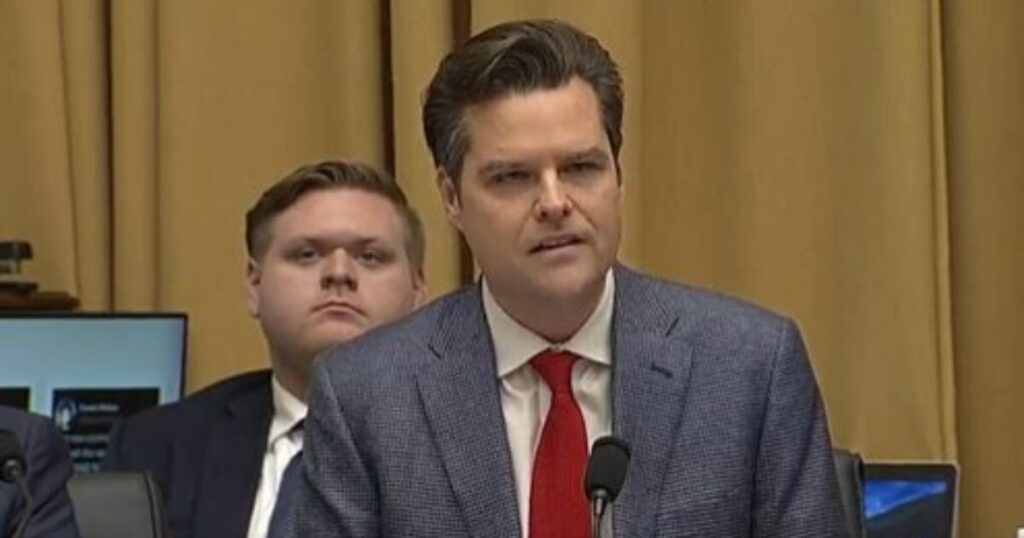In a dramatic turn of events, former Congressman Matt Gaetz suggested he might re-enter Congress to expose his colleagues’ settlements related to sexual harassment cases, which were allegedly funded by taxpayers. This bold assertion came after the House Ethics Committee voted to release a report that could potentially harm Gaetz’s reputation. Although Gaetz had resigned from Congress to assume a role nominated by President Trump as U.S. Attorney General, the Ethics Committee’s report was no longer applicable since he had left office. This scenario sparked Gaetz’s plan to make a controversial return to Congress in January 2025, where he intended to unveil information about fellow lawmakers and their alleged misconduct while leveraging the privileges associated with his elected office.
Gaetz’s inflammatory tweet outlined a strategy wherein he would first be sworn into Congress for the 119th session, participate in the election of the Speaker, and then fast-track towards exposing settlements reached through public money for sexual harassment claims. He posited that such actions would illustrate transparency and accountability, claiming a continuing pattern of misconduct among lawmakers. This plan drew significant attention given Gaetz’s history with scandal and his outspoken criticism of colleagues, particularly concerning sexual harassment issues that remain rampant in Congress. His intentions reflect a culmination of ongoing tensions within the Legislative body, which has faced scrutiny for handling allegations of sexual misconduct internally, often through confidential settlements.
The broader context of Gaetz’s threats relates to a persistent issue within Congress: sexual harassment. The significance of this problem is compounded by the ongoing silence and secrecy around the resolutions to such complaints, measurably highlighted by Rep. Jackie Speier’s testimony about taxpayers shelling out over $15 million to settle relevant lawsuits. Reports suggest that there is considerable underreporting of incidents, creating a reputation of a “creep list” among female lawmakers and aides who endeavor to document the behavior of male colleagues known for lewd acts. These revelations underline a cultural crisis concerning workplace safety, accountability, and transparency in Congress.
Despite misleading narratives depicting Congress as a bastion of propriety, the allegations of systemic abuse linger. The Congressional Office of Compliance acknowledged the extension of harassment claims, providing yearly breakdowns without disclosing extensive details related to individual cases. The procedural aspects of how claims are resolved contribute to a perception of impunity among offenders and dissatisfaction among victims. As Gaetz prepares for a potential return, his call to reveal these settlements has reignited debate on the confidentiality that has traditionally shrouded such cases and provided cover for many legislators accused of inappropriate behavior.
Gaetz’s motives for threatening to expose these alleged abuses could be interpreted in various ways, particularly as they come amid a broader conversation surrounding workplace harassment, gender equity, and the responsibility of Congress to enact reforms. His approach resonates with calls for more robust measures to prevent harassment and provide recourse for victims, seeking to break the cycle of silence that has historically plagued legislative discussions around the issue. Nonetheless, the authenticity of Gaetz’s intentions remains suspect, as some view it as a potential political maneuver to gain notoriety or deflect attention from his own controversies.
Ultimately, Gaetz’s proposed actions serve as a reflection of deeper systemic issues within Congress. The dynamics at play illustrate the complexity surrounding legislative accountability, as well as the important calls for change in how allegations of misconduct are treated. Whether or not Gaetz will follow through on these threats remains to be seen, but they undeniably shine a light on the challenges lawmakers face regarding sexual harassment claims and the significant need for greater transparency and reform moving forward. The discourse surrounding accountability, ethics, and the utilization of taxpayer funds in resolving serious allegations underlines a complex narrative that continues to unfold within the congressional arena.

